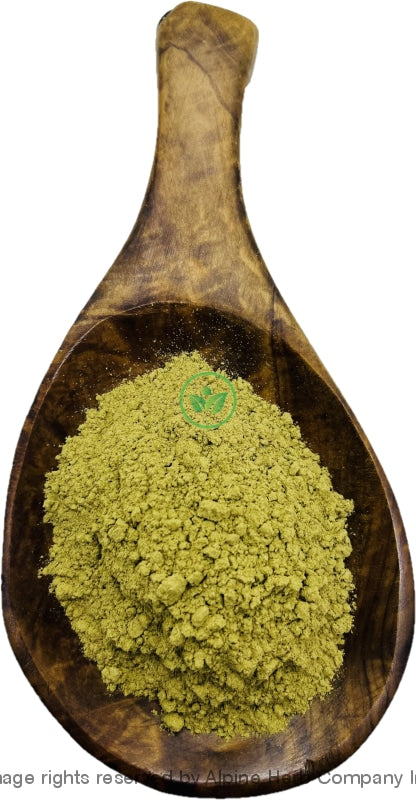Savory Leaves Powder Alpine Herb Company Inc.
$ 6,49 $ 3,89
Botanical Name: Satureja hortensis
Common Name:
- English: Summer Savory, Winter Savory
- Also, known as: Bonekruid, Chubritsa, Bonenkruid, Sarriette, Bohnenkraut, Pfefferkraut, Santoreggia, Seibari, Sabori, Segurelha-das-hortas, Ajedrea, Sabroso, Kyndel,
Origin: Morocco
Harvested: Cultivated
Parts Used: Leaves
General Information:
Savory is native to Europe and Asia. The plant grows to a height of about 1 foot, has small aromatic greyish leaves that turn purple (in late summer) and white, pink, or violet flowers. There are thirty species of savory. Summer savory is the fresh or dried stem tips with leaves. They are soft and succulent with a spicy, peppery taste and an aroma reminiscent of thyme and oregano but with a hint of mint.
Savory is indigenous to southeastern Europe (summer savory) or the Mediterranean region, including southern Europe and North Africa (winter savory). Thyme-leaved savory originates from the southeastern parts of Europe specifically Balkans, Crete and Greece. Savory has a long history of use as medicine and also for its alleged aphrodisiac properties, as the generic name derived from “satyr’s herb” suggests. The leafy stems tips are picked and used fresh, but dried summer savory is commercially available as a spice herb in some countries. Regular harvesting and pruning is beneficial to prevent flowering and prolong the production of new leaves.
How to use:
Powdered Herb:
There are different ways to use powdered herb.
Food Preparation: You can add powdered herbs to any super food, herbal smoothie, sauces, spreads and even cookies. Also, for children, you can mix powdered herbs with honey or glycerin to make a paste. The thicker the paste, the more potent and herbal in taste. The sweet taste of honey and glycerin will help the medicine go down. This method is also known as “Electuaries”.
Capsules: Encapsulating your own powdered herb at home, give you assurance that the contents of the capsules are pure herb and no filler or any other products. These capsules can be taken with liquid.
Poultice: Poultice can be made with an herbal powder and liquid (mostly water) to form a paste which is then applied to the skin. This method is very helpful for skin conditions.
Herbal shot: Powdered herb can be mixed with water, fruit juice or other liquid to make herbal shot.
Precautions:
You should consult with a qualified healthcare practitioner before using any herbal products, particularly if you are pregnant, nursing, or on any medications.
All information on this website is for educational purposes ONLY.
This information has not been evaluated by Health Canada.
This information is not intended to diagnose, treat, cure, or prevent any disease.
| Unit Size | 100g, 200g, 400g, 1kg |
|---|
Prompt shipping and expert packing
Thanks to our longstanding association with UPS FedEx DHL as well as other leading global carriers, we can offer a variety shipping options. Our warehouse staff is highly trained and will be able to pack your goods in accordance with our precise and exact specifications. Your items will go through an exhaustive examination before they will be securely packaged before being delivered. We ship to hundreds of thousands of customers daily in different countries. This is a sign of our determination to become the largest online retailer worldwide. Warehouses and distribution centers are located throughout Europe as well as in the USA.
Note that orders containing multiple items are processed according to the particular item.
We will thoroughly inspect all items ordered before shipping. Most orders are shipped within 48 hours. The delivery time will be between 3 and 7 working days.
Returns
The stock market is always changing. It's not entirely managed by us since we're involved with several entities, including the factory and the storage. Therefore, the actual inventory could fluctuate at any moment. Please be aware that it is possible that your order could be out of stock after you've placed your order.
Our policy lasts for 30 days. If it's been more than 30 days since the date you purchased your item We're sorry to say that we can't offer you a full exchange or refund.
You can only return a product if it is unused and still in the same state as when you received it. The item should be in the original packaging.
Related products
Herb Powder
Herb Powder
Herb Powder
Leaves Powder
Herb Powder
Herb Powder
Herb Powder
Herb Powder
Herb Powder
Herb Powder
Herb Powder
Herb Powder
Herb Powder
Herb Powder
Herb Powder
Herb Powder
Herb Powder
Spices Powder
Herb Powder
Herb Powder
Herb Powder
Herb Powder


































